FROM OUR PARTNERS
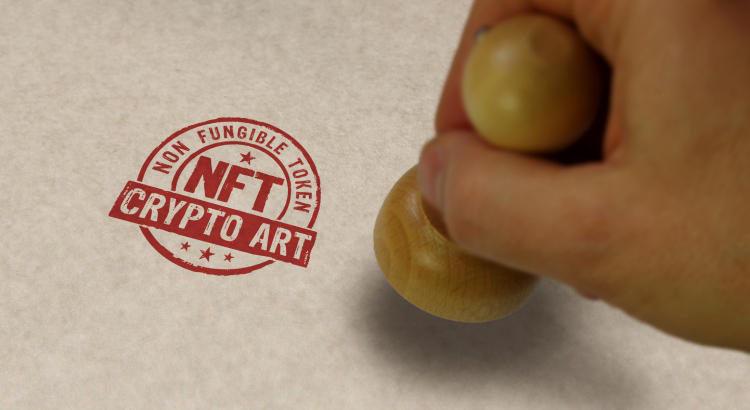
So, you’ve heard of NFTs, and now you’ve landed here. Maybe your up-to-date tech friend can’t stop talking about them at brunch, and you want to get in on the conversation. Or, you want to get involved in trading NFTs.
So, what are NFTs, and what can I do with them?
Let’s get into it.
Non-Fungible Tokens are one-of-a-kind digital creations that are stored on a blockchain. The term Non-fungible means the “token” or item cannot be replaced with anything else. If I trade you a bitcoin for another bitcoin, you’ll have the same thing. NFTs are the opposite—they are not interchangeable. Each NFT is unique.
It’ like trading the ‘2005 The Cup #180 Stanley Crosby Rookie Card (Autographed)’ for a Pokemon or Magic the Gathering Card. You’ll end up with something way different.
The whole point of NFTs is that they are unique. When you buy NFTs, what you get is the digital record of ownership. NFTs can be solely digital, like digital art, music, or video files, or represent items in the physical world, such as hockey cards or paintings hanging in art galleries. They can even represent larger physical assets such as homes!
NFTs are the new age in art, allowing artists to take much greater ownership of their digital creations.
The most expensive auction sale of an NFT to date was on Christie’s Beeple’s Everyday, The First 5000 Days where the crypto artist made a unique digital illustration every day for 5000 days and compiled them in one image. This NFT sold for $69 million. This staggering price has drawn the wary and the bullish alike, helping drive a massive upsurge in interest in NFTs.
In hitting music too! 3LAU, a chart-topping EDM producer sold 33 NFTs of his original album Ultra Violet. The top bid being $3,666,666 US by Bidder65.
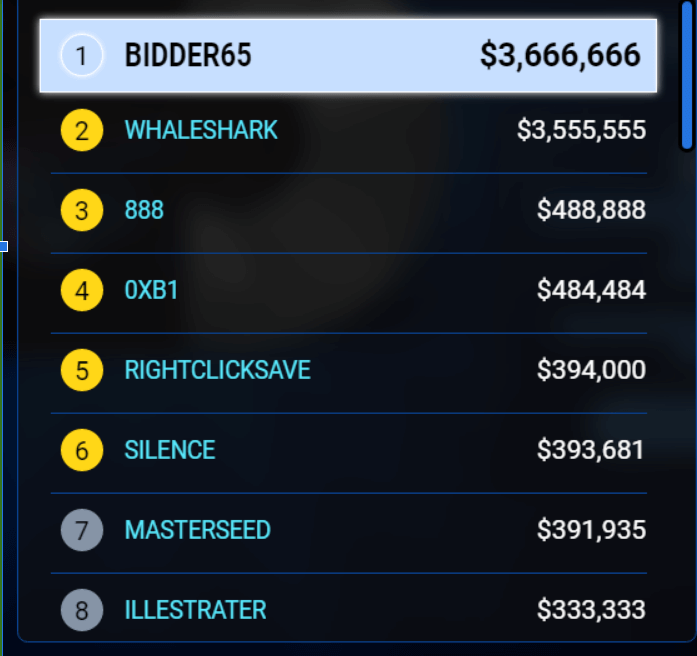
NFTs cannot be deleted or tampered with because of blockchain technology. Once the NFT record exists, it cannot be changed, and there is a record of every time it is sold along with a change of ownership.
In short, NFTs create an organic marketplace for art that is not controlled by a select few.
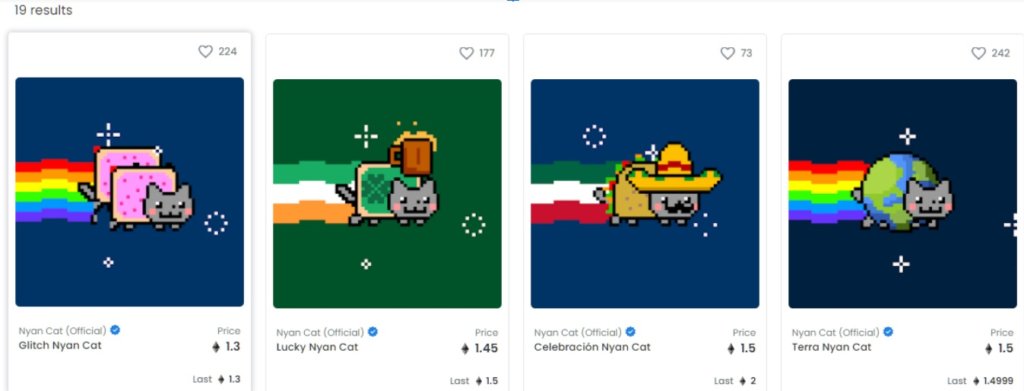
This is a small part of the official Nyan Cat NFT gif collection on Opensea. The price is in Ethereum, which is a cryptocurrency like bitcoin or dogecoin.
NFTs are added to the Ethereum blockchain when “minted” or created. This means NFTs are stored on a unique, immutable (unchangeable), peer-to-peer distributed ledger verifying the authenticity of each individual NFT. The blockchain supports the NFTs by allowing them to work slightly differently than Ethereum coins.
While there are other blockchains that support NFTs, the most popular one so far is Ethereum. The NFTs on it are priced in its native cryptocurrency ETH. NFTs are traded on marketplaces that curate accounts. These marketplace websites such as Mintable.app are networks that connect to the Ethereum blockchain and offer a service called “Minting” wherein the NFT creator “mints” an NFT, creating a record of it on the blockchain. This makes the NFT permanent. The creator (you!) assigns a price in Ethereum and then potential buyers can set bids!
The marketplaces connect to wallets that have Ethereum. In order to buy from Mintable.app, for example, you need to connect a wallet and pay for NFTs in ETH from that wallet.
A cryptocurrency wallet is a software that stores public and private keys while interacting with blockchains. You can think about it as software that holds passwords. Wallets enable users to send and receive digital currencies and monitor their balance.
There is no actual cryptocurrency stored in wallets. The transaction is signified as a record on the blockchain and a balance change is made on the wallet.
NFTs require wallets to record the ownership transfer and other transactions filed.
You collect them, own them, buy, sell, gift them like anything you can own in the physical world. NFTs are an answer to the problem of digital ownership. If I have a file of a photo, I can upload it to the web and others can download it. Unless I add a watermark, which can be removed by skilled editors, I have next to no control. Anyone can claim it’s their photograph instead and use it for whatever they like. An NFT acts as proof against it. It’s a record of the digital representation of original artwork or the original digital art itself. It’s like giving Mona Lisa her own digital signature that represents the original copy hanging in the Louvre.
The blockchain technology NFTs are stored on are transaction records verifying the authenticity, ownership, and all records associated with those NFTs. It’s art, collectibles, and physical assets recorded in a non-centralized form. This takes power away from very niche markets run by a few people and curators and allows artists to take much greater control and ownership of their work, and for many more people to discover them.
For example, if I was an artist with clout and made an NFT, I can mint it and set a royalty fee any time it’s resold. It also creates a new market for artists and sellers to bring their creations or assets to markets not controlled by single companies or groups, but the entire world.
Here are the seven steps to make and sell NFTs.
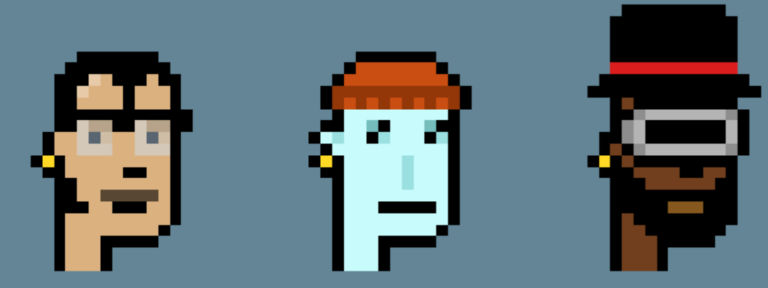
To get involved with NFTs, start by using your brilliant creativity to create something amazing in a digital form. Above are examples of Crypt Punks, one of the most valuable and popular NFT collections.
There are many online tutorials to create digital art, and you can look for inspiration on many websites. Rarity.tools is an NFT ranking website that shows the top NFTs, the latest released, and provides news and tutorials about the NFT space. This is an excellent place to get you started.
You can design an interesting character or group of characters, or illustrate something totally unique and abstract. It’s really in your creative hands!
Once you have your digital art piece in hand, you need a wallet that can hold Ethereum; we recommend Metamask. Use their Chrome Browser extension and get some Ethereum.
Next, open an account on a marketplace like Opensea, Rarible, or Mintable and connect your MetaMask wallet.
Here is an example of how to use Mintable to connect your wallet:
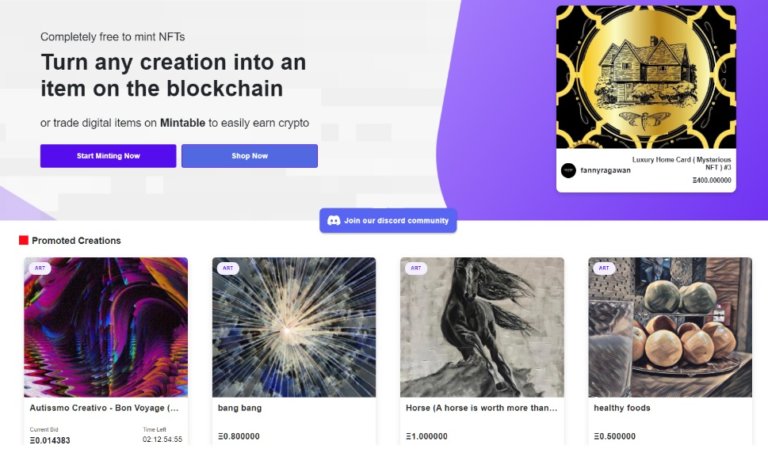
Go to Mintable.com and click on “Connect Wallet.” The next screen asks for your wallet provider, which is MetaMask. It connects easily if you have the Chrome extension for MetaMask.
A popup asks you for confirmation.
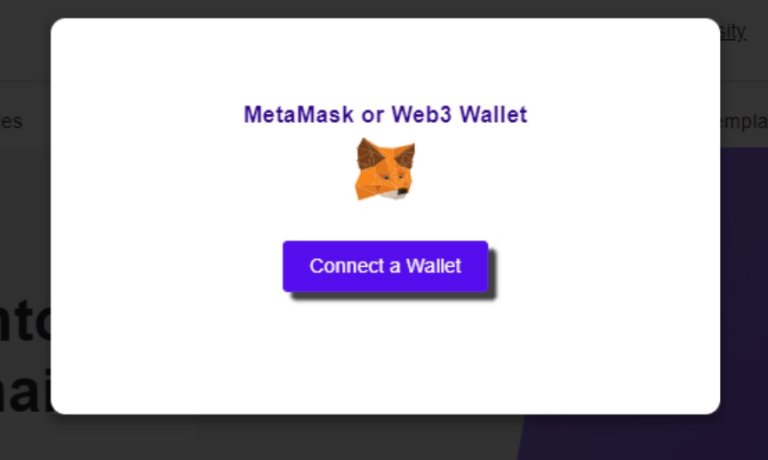
Now, you can upload your beautiful art to an NFT marketplace. To do so, click “Start Minting Now.” If you already own an item in your wallet, you can upload it to the market by going to option 1: “the NFT is already in my wallet.”
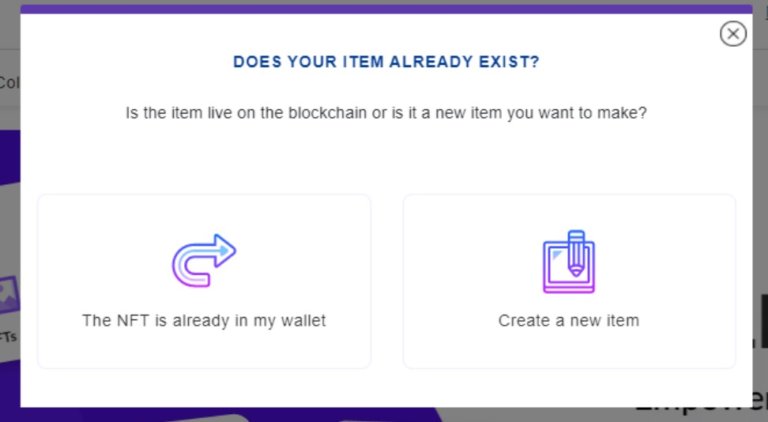
This will prompt you to enter a token ID and address.
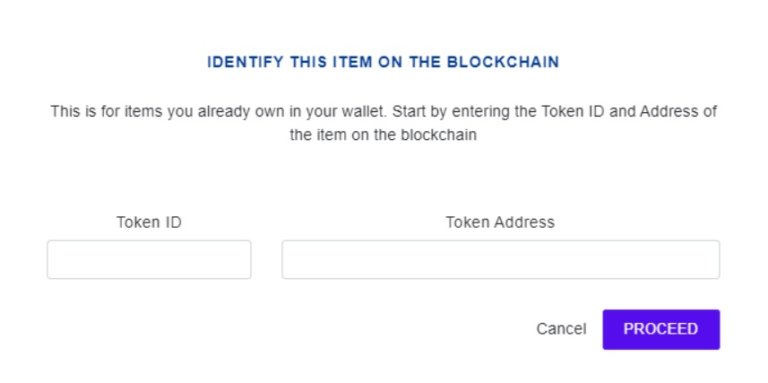
However, if you are making a new NFT, go to “Create a new item.”
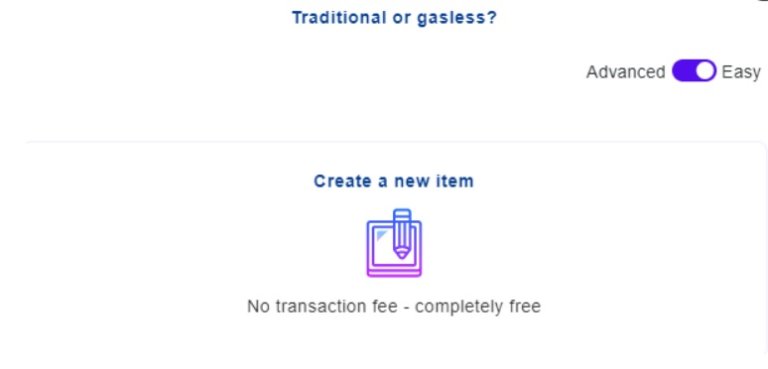
Mintable has two options. You can mint something for free, and a gas fee will be charged upon the sale or transfer. Or, you can pay the gas fee and have the item in your wallet with all features included. We will choose the “Easy No Transaction” fee for this example.
Then, we upload our world-changing work of art! Below is the smile made in Paint3D in about 30 seconds. It is highly recommend putting more creativity into your first NFT.
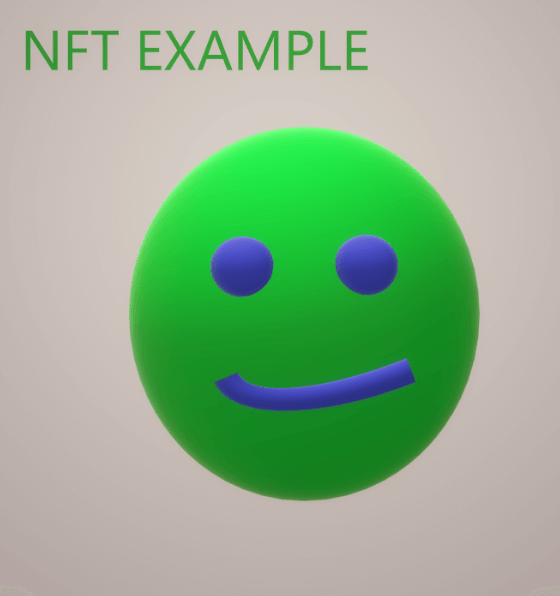
Most marketplaces allow a set of options when creating a sale. Auctions are recommended to be marketed first offsite or in the artist’s fan community. We will go with Fixed price for this example. Select a Category or multiple ones, add a title and description.
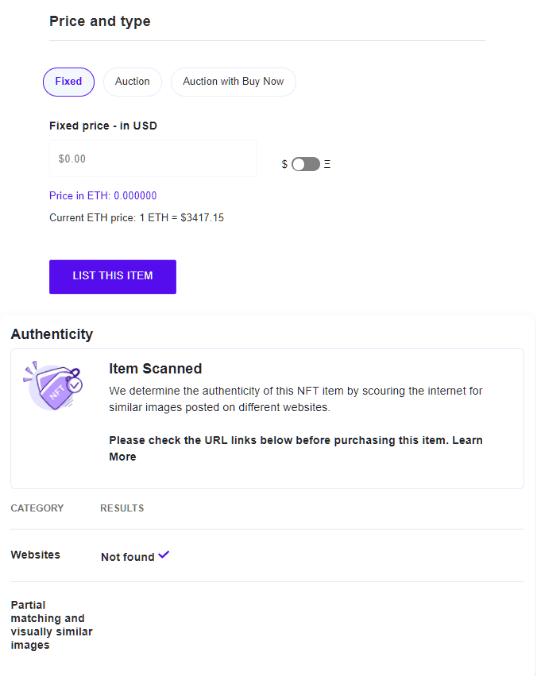
The lowest price in ETH we can list for is 0.0001 or .34 Cents, but Mintable will warn you that the gas fee exceeds the price of the item! You can also set the field to USD instead. We set ours at 0.04 ETH or 136 USD at the time of writing.
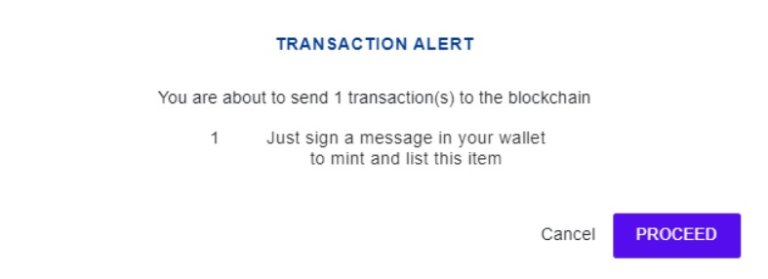
Click proceed, then click the confirmation link in the Wallet extension, and then… Viola! We just made our first NFT!
Note how you can link out? You can embed the NFT in your website or store or Twitch or Youtube page, wherever you are present online! This allows people to go and see that you have an NFT and they can decide if they want to buy it!
When you Create an item and Connect your wallet to pay the listing fee, you are being charged a Gas fee in ETH that goes to the network as an incentive for miners (individuals or organizations that compute the Ethereum blockchain using processing power and record transactions to receive ETH from the network). Listing fees fluctuate heavily as we mentioned before, and sometimes they even exceed the artist’s desired sale price.
NOTE: Gas fees were created to prevent malicious users from spamming the blockchain and taking it over. Gas fees for an NFT listed at around 1 ETH can fluctuate heavily. The option to mint my own NFT on Opensea gave me a gas fee last week of $90. Now it’s at $241 to mint the same item, at the same price.
The Gas fee on the Ethereum chain fluctuates depending on traffic on the network and the price you set. Gas are denoted in units called Gwei. Each Gwei is equal to 0.000000001 ETH (10-9 ETH). Gas fees are higher when the network is very busy. Artists can pay 25-75% of their sale price as gas fees, so be careful and be wary.
However, there is hope when it comes to Gas fees. New protocols that bridge technologies are emerging such as Polygon (MATIC) that help massively reduce gas fees.
So what can I do with my NFTs? The next step is to market your NFT and let the world know. This is why artist already successful are winning in the NFT space. They already have channels to promote with. This is an uphill battle for those less known, but it’s certainly not impossible to get good quality work noticed.
So now that you’ve made your wonderful digital creation, you can leverage your following! If you don’t have a following, start with anyone near you with an internet connection who wouldn’t mind liking a post on your social media page. Start posting things everywhere. Make content constantly. You can create a WordPress site for free and eventually purchase a custom name for the site and custom address (URL). Visitors to your site can find a link to buy your NFT!
The wild volatility of cryptocurrencies and the confusion around blockchain technology, its novelty, and lack of transparency on many platforms is why explaining NFTs is so difficult. Here’s hoping you learned something, and if you take away anything from this, it’s that NFTs are not something to jump into lightly!
If you do decide to embark on the NFT journey, the sooner the better as such booms don’t always last. Think about the dot com bubble, as this is having a similar effect in scale.